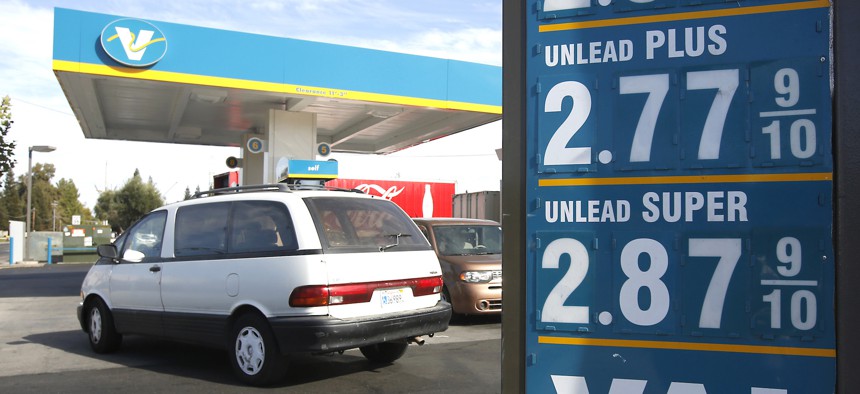Gas Tax Hike in an Election Year? It'll Be a Tough Sell in Congress

Shutterstock

Connecting state and local government leaders
Despite flickers of bipartisan support for upping fuel taxes, the idea has yet to gain serious momentum.
WASHINGTON — Raising the federal gas tax to help pay for infrastructure will be no easy feat in Congress, particularly in an election year, top lawmakers from both parties on a House transportation committee acknowledged Wednesday.
Discussions about whether to raise the tax are simmering on Capitol Hill as lawmakers discuss an infrastructure blueprint President Trump put forward last month that calls for $200 billion of new spending but does not propose new revenues to cover the cost.
The Highway Trust Fund, meanwhile, has had its finances weakened in recent years by eroding fuel tax revenues. The fund is a primary federal account for covering road and transit costs and is funded mostly by revenues from taxes on gas and diesel.
It's not clear yet to what extent any legislation that emerges in the weeks or months ahead will mix the proposals Trump has put forward, with measures to address the trust fund.
The debate playing out about infrastructure, and how to pay for it, has implications for the dollars that flow from the federal government down to the state and local level to help fund projects.
"Everybody wants to talk about gas tax," Rep. Sam Graves, a Missouri Republican who chairs the House Transportation and Infrastructure subcommittee on highways and transit, told reporters.
“The reality of trying to pass a gas tax in Congress right now is, you know, it’s a pretty tough lift," he added.
If lawmakers are incapable of that lift, or some other step to raise revenues, Rep. Peter DeFazio, of Oregon, the ranking Democrat on the full House Transportation and Infrastructure Committee, says it's a waste of time to push ahead with a major public works package.
“If you don’t increase taxes, we’re not having an infrastructure bill," DeFazio said.
He noted the House Ways and Means Committee, which has jurisdiction over taxes, has not held "a single hearing" to discuss infrastructure revenues or the trust fund. DeFazio charges that House Speaker Paul Ryan is “is ideologically opposed to federal investment and increasing taxes, in any form," and that this poses a problem.
Ryan's views aside, Graves points out “there are a lot of members out there that are just philosophically opposed" to increasing the tax.
The federal tax on gasoline is 18.4 cents per gallon, in line with its 1993 level. The tax on diesel is 24.4 cents per gallon. Fuel taxes are not indexed to rise with inflation and have been undermined as vehicle mileage has improved. Electric vehicles pose another challenge for the viability of the tax.
Graves says he is a believer in mileage based fees as an alternative to the gas tax. But a state transportation official who testified before his subcommittee Wednesday said it will likely be a decade before such user charges can be widely adopted. Graves disagrees and said the fees could be imposed on commercial vehicles in the near-term.
Rep. Bill Shuster, a Pennsylvania Republican who chairs the full House Transportation and Infrastructure Committee, recognized that many lawmakers in both parties "may not be too warm and fuzzy" on the idea of a gas tax increase ahead of the November elections.
But he suggested, as he did last week, the "lame duck" session after the election could provide an opening for legislation—the idea being that action during that window could pose less political risk. Shuster has said he is not planning to seek reelection this year.
The chairman argues that 31 states raised their gas taxes in recent years and lawmakers in those places did not pay a heavy political price for doing so. "I for one think it's time to do it," he said. "The president has said he would support that."
Trump reportedly floated the idea last month of a 25-cent gas tax increase to lawmakers.
“I believe we will pay a political price if the trust fund runs out in October of 2020," Shuster added, referring to when legislation shoring up the trust fund with general fund transfers will expire.
Senate Democrats on Wednesday released a $1 trillion infrastructure plan of their own that calls for rolling back provisions in last year's GOP-led tax overhaul to fund public works.
The Democratic plan says it will target parts of the tax law that benefit wealthier Americans and corporations. For instance, restoring the top individual tax rate to 39.6 percent, from its new 37 percent level and lifting the corporate tax rate to 25 percent from 21 percent.
The House Transportation and Infrastructure subcommittee on Highways and Transit held a hearing on Wednesday to discuss "long-term funding for highways and transit programs."
Michael Lewis, executive director of the Colorado Department of Transportation, testified for the Western Road Use Charge Consortium, a group that serves as a clearinghouse for information about pay-by-mile systems that might one day replace the gas tax.
He told the committee "we are not there today" in terms of being able to fully implement a broad vehicle-mileage fee system and that the ability to do so is probably still about 10 years away.
"If we're ever going to get to a road usage charge," Lewis said, "we need a bridge to get there."
Bill Lucia is a Senior Reporter for Government Executive's Route Fifty and is based in Washington, D.C.

NEXT STORY: Microsoft 365 is coming to the Government cloud





